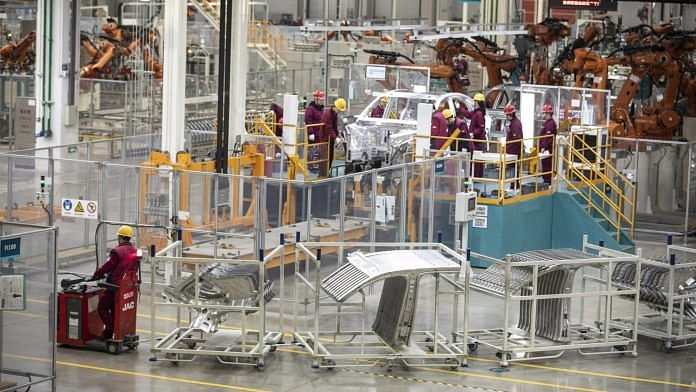For all the speculation swirling around the Apple Car, it’s worth considering where the parts will come from and how it will be made.
In recent weeks, reports that Apple Inc. is jumping into the electric car race have resurfaced. Contenders for contract manufacturing, like Canada’s Magna International Inc., have started to emerge. South Korea’s Hyundai Motor Co. might also be a suitor. The iPhone maker could (finally) have a passenger car by 2024, or even earlier.
Much of the electric car industry’s focus has been on the software and technology side of things — metal valves don’t get people as excited as augmented reality. But even if they’re boring, components are critical for making artificial intelligence a reality. These parts are increasingly being made in China.
Beijing is securing larger pieces of the value chain. Consider what’s happening in global auto markets right now: Complaints of shortages in semiconductor chips, the key component for more sophisticated features, are rising as carmakers are being forced to cut output and idle plants. While China has for years lagged in chip production, it’s now amid an aggressive push to take over large swathes of a complex supply chain and rely less on imports. Chinese manufacturers such as Zhuzhou CRRC Times Electric Co. and BYD Co., which have added production capacity for these parts, will likely benefit. Companies at home and abroad will turn to these viable substitutes.
Whether the world’s largest car market can make the next best electric vehicle from start to finish is up in the air. In April 2019, at the Shanghai Auto Show, I was amazed by the range of snazzy options. But there was just one of each — they were concept cars. When it comes to the future of transportation, commercial scalability of the technology matters. Tesla Inc. learned this the hard way, and eventually found a path out of “production hell.” This is perhaps a reason why Elon Musk finally turned to China, where he has set up a facility and now has a long list of eligible suppliers for essential parts like batteries, valves and glass. In doing so, Tesla also managed to reduce costs by more than 30%.
With global auto markets navigating rough terrain, this much is clear: Whoever succeeds will be all but reliant on China’s booming electric-vehicle parts makers. This need will take precedence over global trade tensions and looming fears of technology domination. Hard-component suppliers have already taken over large parts of the global share of production. China makes more than 70% of cathode material, a crucial part of all batteries, and 40% of connectors – the extra high-voltage wiring systems that link batteries with the motor and other parts. When it comes to the battery power train, China has 70% of global capacity and 80% of the materials needed. Electric cars in general need more of these parts than internal-combustion engine ones. The scale also lowers costs.
This means China’s electric-vehicle component industry – from batteries to thermal management parts and heads-up display glass – will likely find a place in every potential car champion.
With the cost of adoption one of the biggest barriers for electric vehicles, Apple could do with its own list of parts suppliers. While big automakers have platforms for their electric-car manufacturing ambitions, and others, like iPhone assembler Hon Hai Precision Industry Co. are getting in, component makers remain key. Of the more than 90 patents the company has applied for since 2017, it was granted just four last year that were related to cars and head-up displays – or augmented reality windshields. One of the largest auto glass manufacturers in the world, Fuyao Glass Industry Group Co. has been adding such high value-added products to its offerings.
For Apple, that means it doesn’t have to rely on traditional carmakers and manufacturers – the road to its car of the future can now run through China. – Bloomberg
Also read: Why hybrid cars are grabbing more road than electrics



